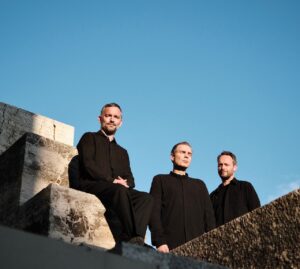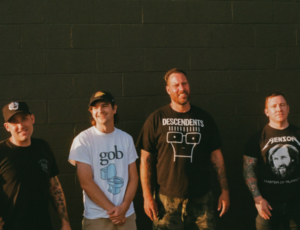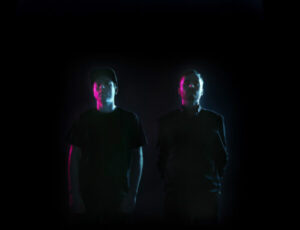Usually, long-haired figures in rainy back alleys are people you should avoid. But sometimes, they happen to just be the lead singers of popular rock bands. Walking up to them is, understandably, a gamble most people don’t usually take.
On Monday afternoon, I was standing in a back alley behind The Vogue Theatre, when I noticed such a figure approaching me. Luckily, it wasn’t an escaped convict ready to acquaint me with his shiv. It was only Claudio Sanchez, lead singer and guitarist for the band Coheed and Cambria; and thank goodness, because I had been waiting for him to show up.
Later that night, Coheed and Cambria would play a fantastic show in The Vogue to a sold-out crowd, but on this rainy afternoon, Claudio and I were going to sit down and talk about the release of the band’s double album, The Afterman, the new line-up, and how the fiction of Coheed and Cambria is incorporated into the music.
We made our way inside, down a flight of stairs and into a green room which thankfully had a sink and some Kleenex nearby, because I was just coming off of a cold.
“Wait, you’re sick?” Claudio asked after we shook hands and he heard me sniffling a bit. He got up and immediately washed his hands. “Sorry, I’m a bit paranoid about getting sick. During the last tour I had to cancel a bunch of shows because I was singing while sick and I got polyps in my throat.”
Suddenly terrified I infected Claudio Sanchez, I moved my chair a few feet away from his. He laughed, which I hoped meant we could get underway, and that it wasn’t just some strange early symptom…
Vancouver Weekly: Now that both The Afterman: Ascension and Descension are out, what was it like to release what is essentially a single album in two separate chunks?
Claudio Sanchez: I feel good, I mean that was certainly the idea, to divide them up into two pieces. For me as a comic book writer, that’s sort of what we do you know, the cliffhanger, to try and get the reader to stay with the story from issue to issue. And that was my idea with splitting these two up; it was using Ascension as kind of a sonic cliffhanger so to speak and allowing Descension to resolve any unresolved questions.
Vancouver Weekly: One of the most unique things about Coheed and Cambria albums, at least to me, is that they’ve always had a sort of expanded fictional element in things like comic books and novels. Is there any plan to expand the story of the Afterman into something non-musical?
CS: Oh yeah, for sure. I mean, right now I’m actually working on [adapting] Good Apollo 1 and 2. So once I finish the Coheed story of The Amory Wars I’ll probably push it to the Sirius chapters.
Vancouver Weekly: And is that the plan for comic books as well?
CS: Probably yeah.
Vancouver Weekly: Your songs tell these stories, and on one hand they’re these fantastical adventure stories, but on the other hand, taken on their own, they’re these very relatable ‘everyman’ stories. What comes first for you – the fantasy or the story of the ‘everyman’?
CS: More so the story of the ‘everyman’, certainly with The Afterman. When I started writing the records, there was no concept. Coheed and Cambria’s story was finished as well as the prequel story Year of the Black Rainbow, so I wasn’t exactly sure where I would go next and so the band kind of took – I wouldn’t say a hiatus – but we took some time off. We didn’t go into the studio right after the tour for Year of the Black Rainbow. We just let life kind of inspire whatever art was going to come about it, so that’s basically what Afterman is. It’s a retelling of the two years I spent not being in Coheed and Cambria. And I don’t mean that in a negative way, I just mean that we weren’t touring or writing records. We weren’t on the clock, so to speak.
Vancouver Weekly: For listeners, each upcoming Coheed album has traditionally been a known quantity, at least thematically. Barring some minor reshuffling, the first five albums were all part of one finite story and after Year of the Black Rainbow, the following albums could have justifiably been about almost anything. What inspired you to tell the story of The Afterman?
CS: I mean, I created all this material and then looking at it in hindsight, [I thought] how could I transform this into one cohesive piece? So I found the thread in the story, and then I thought – you know I’ve never told the story of Sirius Amory, he was always touched upon in the Coheed and Cambria saga and he is kind of a big deal. All of these characters are fighting over this energy source that he essentially discovers. So I figured why not take my experiences and give them to him?
Vancouver Weekly: Is a lot of your own personal story mixed in?
CS: Oh yeah. Everything. Afterman, the title track, I wrote that song when I was in Florida and my wife had discovered that a very personal friend of hers had passed away in a motorcycle accident, and she had discovered it on Facebook, so that was very strange. I’d never witnessed anything like that so I wrote that song about her experience, and I took that experience and I gave that to Meri, the wife of Sirius Amory, when she discovers that Sirius’ ship has blown to bits in the Keywork and no one really knows what the status of it is.
Vancouver Weekly: When I spoke to Travis Stever in October* he had nothing but great things to say about playing with Zach Cooper. Do you find yourself arranging differently to accommodate his strengths? For instance, it seems like he’s a very comfortable vocalist himself, and obviously he has a strong handle of the bass – do you find this affects what you’re able to do on stage or in the studio?
CS: No, not really. I mean, the material was written before Zach, and before Josh [Eppard] for that matter. It was really just, we found a bass player that we thought was great and complimented what we did, and that’s what he did, just like Mic [Todd] would have. He put his stamp on our records.
Vancouver Weekly: Playing with Josh Eppard again, is the band experiencing a return to the familiar, or in your time apart has Josh and the band both become something quite different?
CS: We’re so familiar with each other that it just clicked. When I started demoing this material, before both new members, the drum situation just felt like the songs were missing something. I think Josh is a great punctuator. He keeps the song at the front of his mind as opposed to what his part is going to bring to the song. He’s really like, “how can I strengthen the tunes first”, and in that way I think of him as this great punctuator. He finds these phrases that really resonate with him as they would I think anybody just listening to the songs, and he has this way of just accenting them and making them important. When we first started playing together, it was kind of instant. The first song we played together was 2’s My Favorite 1 – funny because it’s the last song on the whole double record, and I knew immediately that this is what the band needed for this. It was instantaneous.
Vancouver Weekly: One thing Travis mentioned when I spoke with him earlier is that “Iron Fist” is actually a bit of an older song. Can you talk about where it came from? Was it changed at all to fit with the theme of The Afterman?
CS: I think a lot of the tunes, the message in the songs is very universal. I think that sometimes gets overlooked with Coheed because the concept is so a part of what we do, that that’s immediately what people gravitate towards and that’s the deciding factor of whether or not they like the band, you know what I mean? But the songs are written most of the time without the concept in mind, and a song like “Iron Fist” is so universal that it’s easy to make it interchangeable and have it work and be an extension of a character’s consciousness. It’s a love song, and that’s essentially what Afterman is – it’s a story of lost love. It’s very easy, it’s simple to take a song like that and just make it work.
Vancouver Weekly: What comes first for you in the song-making process? Lyrics or music?
CS: Music. I mean, I started as a guitar player so for me singing was always the second layer, so usually it’s the music.
Vancouver Weekly: Are other members of the band involved in the creation of the fiction or is it solely your own invention?
CS: No, not really… I mean sometimes we’ll definitely talk about it. They’re more interested in it as ever, but it just continues to be an extension of my thing.
Vancouver Weekly: Thank you for your time!
Needless to say, we did not shake hands as we said goodbye. I didn’t take it personally.
*Read the Travis Stever interview here.










